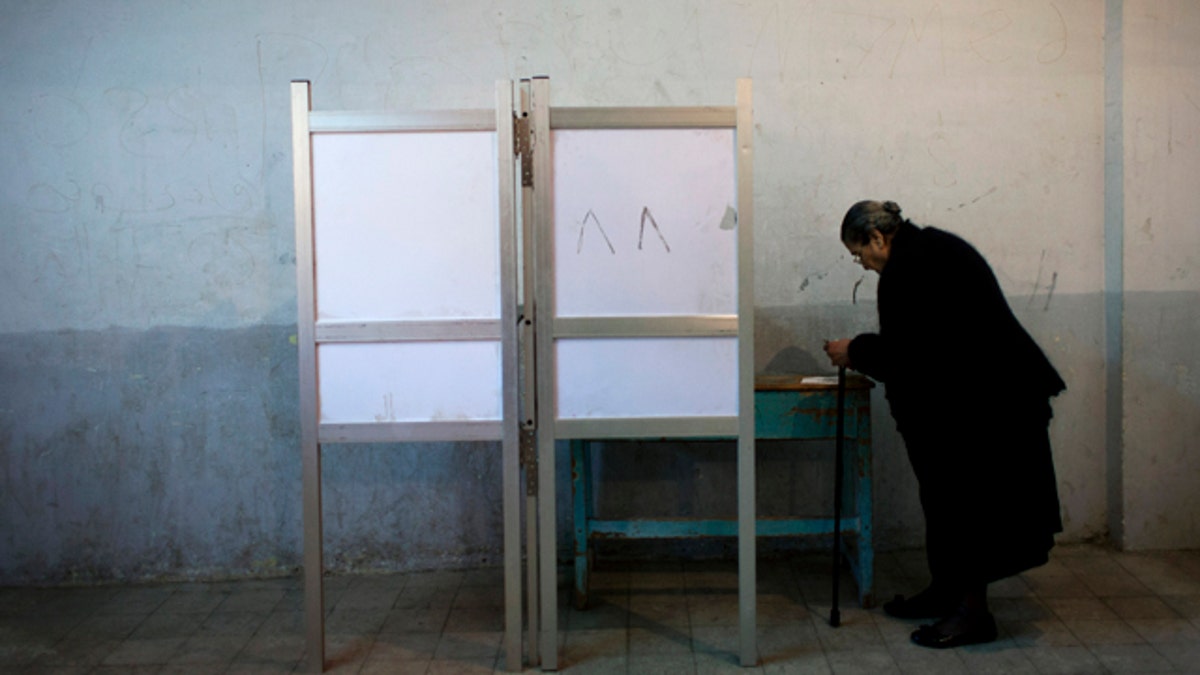
Dec. 15, 2012: An Egyptian woman votes at polling center during a referendum on a disputed constitution drafted by Islamist supporters of President Mohammed Morsi in Cairo. (AP)
CAIRO – Egyptians were voting Saturday on a proposed constitution that has polarized their nation, with President Mohammed Morsi and his Islamist supporters backing the charter, while liberals, moderate Muslims and Christians oppose it.
With the nation divided by a political crisis defined by mass protests and deadly violence, the vote on the disputed charter has turned into a choice between moving Egypt closer toward a religious state led by Morsi's Muslim Brotherhood and the ultraconservative Salafi bloc, or one that retains secular traditions and an Islamic character.
"The times of silence are over," said bank employee Essam el-Guindy as he waited to cast his ballot in Cairo's upscale Zamalek district. "I am not OK with the constitution. Morsi should not have let the country split like this."
El-Guindy was one of about 20 standing in a line for men waiting to vote. A separate women's line had twice as many people. Elsewhere in Cairo, hundreds of voters began queuing outside polling stations nearly two hours before the voting started at 8 a.m.
"I read parts of the constitution and saw no reason to vote against it," said Rania Wafik as she held her newborn baby while waiting in line. "We need to move on and I just see no reason to vote against the constitution."
Critics are concerned about the charter's legitimacy after most judges said they would not supervise the vote. Rights groups have also warned of opportunities for widespread fraud, and the opposition says a decision to hold the vote on two separate days to make up for the shortage of judges leaves the door open for initial results to sway voter opinion.
More than 26 million voters are scheduled to cast their ballots Saturday, while another 25 million will vote next week. Saturday's vote is held in 10 provinces, including Cairo and the Mediterranean port city of Alexandria, the country's second largest and scene of violent clashes on Friday between opponents and supporters of Morsi.
Egypt's latest crisis, the worst since longtime ruler Hosni Mubarak was ousted in a popular uprising nearly two years ago, began when Morsi issued a decree on Nov. 22 giving himself and the assembly writing the draft immunity from judicial oversight so the document could be finalized before an expected court ruling dissolving the panel.
On Nov.30, the document was passed by an assembly composed mostly of Islamists, in a marathon session despite a walkout by secular activists and Christians from the 100-member panel.
If the constitution is approved by a simple majority of voters, the Islamists empowered when Mubarak was ousted would gain even more clout. The current upper house of parliament, dominated by Islamists, would be given the authority to legislate until a new parliament is elected.
If the constitution is defeated, elections would be held within three months for a new panel to write a new constitution. In the meantime, legislative powers would remain with Morsi.
The opposition has called on its supporters to vote "no," while Morsi's supporters say the constitution will help end the political instability that has gripped Egypt since the autocratic Mubarak was overthrown. Clerics, from the pulpits of mosques, have defended the constitution as a document that champions Islam.
Morsi's opponents say minority concerns have been ignored and the charter is full of obscurely worded clauses that could allow the ruling Islamists to restrict civil liberties, ignore women's rights and undermine labor unions.
"At one point in our history, Cleopatra, a woman, ruled Egypt. Now you have a constitution that makes women not even second-class but third-class citizens," said businesswoman Olivia Ghita. "This constitution is tailored for one specific group (the Muslim Brotherhood). It's a shame. I am very upset."
